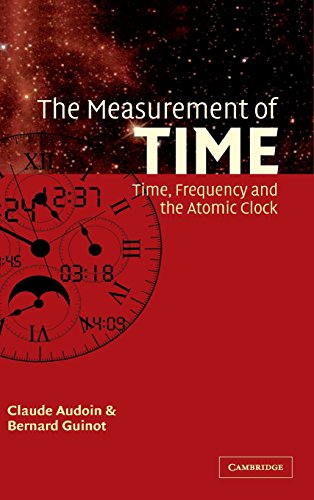Items related to The Measurement of Time: Time, Frequency and the Atomic...

Synopsis
This volume is a comprehensive introduction to the physics of time and time measurement, from an historical perspective to the modern day. It discusses the stability and accuracy of atomic frequency standards, covering different types of oscillators and atomic clocks, and their uses. The precision of atomic clocks and the atomic time scale are considered in the context of fundamental physical research, with relation to general relativity and applications such as the Global Positioning System. The authors also discuss International Atomic Time and its relationship to Coordinated Universal Time and the time scales used in astronomy.
"synopsis" may belong to another edition of this title.
About the Authors
Claude Audoin received his doctorate in physics from the Université Paris Sud in 1967. He was Director of the Laboratoire de l'Horloge Atomique, Orsay, from 1972 to 1985 and managed research programmes related to hydrogen masers, optically pumped cesium beams, trapped ions, frequency stabilised lasers and frequency metrology. He has published numerous papers on the subject of atomic frequency standards and their metrological properties, and is co-author of a previous book covering the quantum physics of atomic frequency standards. Dr Audoin is also on the editorial board of Metrologia and is a member of the Bureau des Longitudes.
Bernard Guinot was an officer in the merchant navy before receiving his masters degree in mathematics in 1952. He then joined the Paris Observatory and in 1958 received the Doctorat d'Etat. His research was devoted to fundamental astronomy, space geodesy and the measurement of time, and he is the author of numerous papers on these subjects. From 1964 to 1988, Dr Guinot was Director of the Bureau International de l'Heure, where he was involved in the transition to modern techniques for measuring the rotation of the Earth and the development of International Atomic Time, which is now under the responsibility of the Bureau International des Poids et Mesures. He is a member of the Bureau des Longitudes and the Academia Europaea.
"About this title" may belong to another edition of this title.
(No Available Copies)
Search Books: Create a WantCan't find the book you're looking for? We'll keep searching for you. If one of our booksellers adds it to AbeBooks, we'll let you know!
Create a Want
